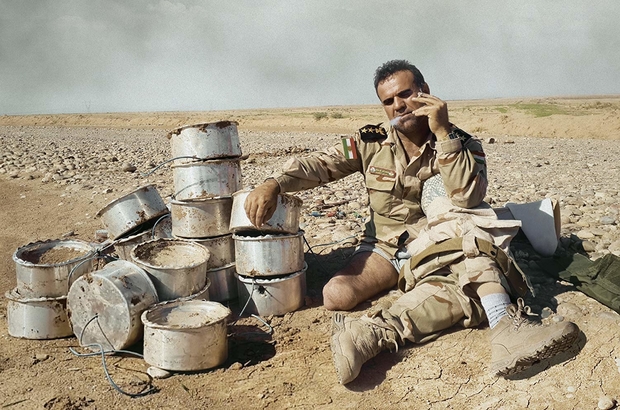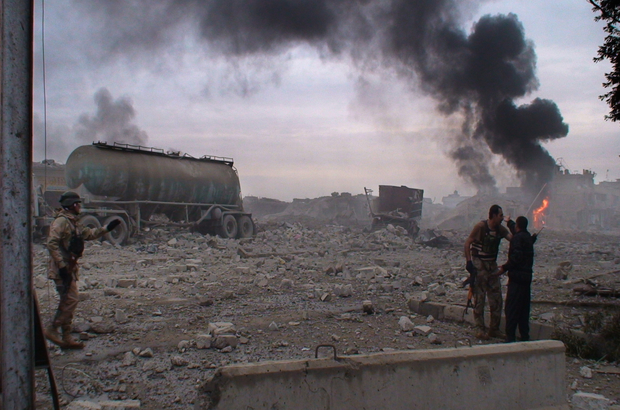JARVIS CARR reviews Hogir Hirori and Shinwar Kamal’s wartime documentary, The Deminer.
There is no music to accompany Colonel Fakhir in the introductory scene of The Deminer (2017) as we sit and watch him deactivate one of the six hundred IEDs (improvised explosive devices) which span his decade-long military career. Instead he stands alone in a wide shot which envelops a vast and empty field lined with dozens of mines; one man driven by a perseverance derived from his own family, a hope that he may make a difference despite the futility of the task he faces.
The documentary is comprised of three sources: interviews from Fakhir’s son and wife (Abdullah and Sheyma Fakhir), footage from his personal camcorder depicting both his footage from the Iraq war, and of his ongoing battle against the Islamic State who planted an indefinite number of mines in Mosul. One such tape shows Fakhir and his colleagues rush out of a mound of rubble and ash seconds before an explosion throws the filming into disarray. The first-person perspective gives a nuanced look into life on the front line. Footage from a handheld camcorder hasn’t been able to provoke such fear and unease in an audience since The War Tapes (2006), yet it does so in a different way – by changing our perspective from that of 3 American soldiers, each donning over $15,000 worth of combat gear to that of a Kurdish Army Colonel armed with a knife and a pair of clippers. Scenes of intense violence are subtly yet impactfully interwoven with clips which wouldn’t look out of place in any family’s collection of home videos; Fakhir’s sons playing football or a fridge dotted with a child’s drawings. For an audience the unimaginable and alien experience of war finds a new resonance when contrasted with these familiar motifs. The way in which the director Hogir Hirori intercuts and melds these sections together evokes a deeply distressing look at the effects of war on family and is where the film really asserts its footing as a powerful yet intimate insight into the life of a family man turned war hero. I no longer feel humbled by the duality of superhero’s lives as presented to us in blockbuster after blockbuster. After witnessing Colonel Fakhir take a call to explain why he’s late on his rent before he nonchalantly strolls back into a literal ticking time-bomb, seeing Spider Man balancing his day job with vigilante work loses its impact.
After the opening credits roll, the film begins with the narration of Abdullah Fakhir over footage of his dad being gifted the camcorder before he departs for war. The effect of having his son as narrator catalyses our bond with the family and intensifies the action which follows. The conflict which does ensue is shown through clips, predominantly silent besides the clipping of wires and calls of caution from his fellow soldiers. One such snippet depicts Colonel Fakhir picking his way through the mine-ridden rubble of what used to be another family’s home, with the eerie quiet broken by the ringing of a mobile phone, the trigger for a mine. It is startling for any viewer that a sound of such banality in Western life can adapt into an infinitely more sinister tone in such a context. Hogir Hirori subverts certain conventions of famous war films, such as Saving Private Ryan (1998), which use extensive sound tracks with a plethora of sound effects. The silence is deafening, it provides more to the film than any number of explosions or gunshots could. Another clip builds up tension in a different way, as we hear Fakhir conversing with his colleagues from a dashcam set to night vision, showing their military vehicle winding its way down a series of long gravel roads as we are left trembling before the inevitable. A recurring theme of the documentary is not whether – but rather when – tragedy will strike.

This is an ingenious film which simultaneously excites and informs, relying almost entirely on over sixty hours of unpublicised footage from the camcorder. The way in which key moments are extracted and reworked to create a superbly paced chronological story which flickers from Fakhir’s family to the front line of war cannot be ignored. It creates an entirely nuanced perspective of a film genre which, though undeniably important to our understanding of war, is largely saturated with clichés of stock characters and formulaic story lines. This is a documentary which will disturb and scare you, and it is by doing this that it allows you to appreciate the world around you.
Featured image source: theartsdesk.com





